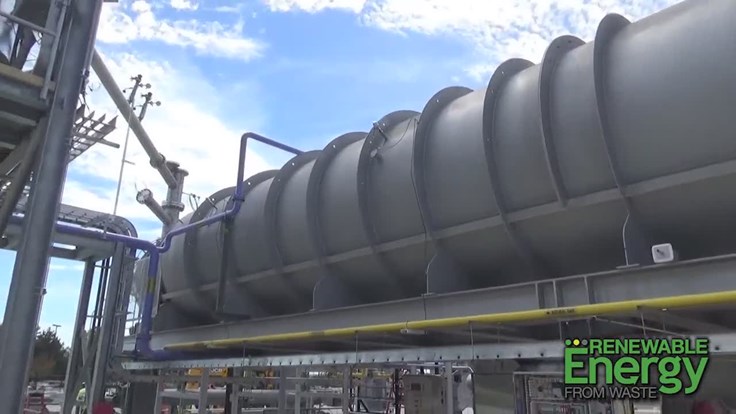From left, Chris Koczaja, vice president of implementation and engineering at PHG Energy; Tom Doherty, environmental specialist with the Tennessee Department of Environment and Conservation; Lebanon Mayor Philip Craighead; Lebanon Councilman Fred Burton, Ward 2; Lebanon Councilman Rob Cesternino, Ward 3, and Jeff Baines, public works commissioner for the city of Lebanon.
The city of Lebanon, Tennessee, has broken ground for a new waste-to-energy gasification plant at the city’s waste water treatment facility that will be capable of processing 64 tons per day of sewer sludge, used tires and industrial wood waste. The facility is being designed and built by PHG Energy, headquartered in Nashville, Tennessee.
“This facility is going to be a model for waste-to-energy partnerships,” Lebanon Mayor Philip Craighead said, “as well as the first stage in moving our city completely away from dumping waste into landfills.”
His remarks were part of a Nov. 12 groundbreaking ceremony that kicked off construction of the new gasification plant that is expected to process the wastes and produce electricity to help power the treatment plant while diverting those materials from area landfills.
The Lebanon, Tennessee, facility will be the company’s 14th commercial downdraft gasification unit to go online. PHGE says the facility will include the world’s largest downdraft gasification unit with a full capacity throughput of 64 tons per day.
PHGE describes its gasification process as a clean thermo-chemical process that breaks down biomass-based material in a high-heat and low-oxygen environment. There is no incineration or burning involved in the process, and the only residue after production of synthetic fuel gas is a carbon biochar that has multiple agricultural, industrial and direct fuel uses, PHGE says.
The syngas will be used to power an Organic Rankine Cycle generator which will provide for the gasification operation’s internal needs, and deliver up to 200 kilowatts of power directly to the operation of the waste plant, according to PHGE.
Tom Doherty, environmental specialist with the Tennessee Department of Environment and Conservation (TDEC), says the new facility is an important step forward in efforts Tennessee and his department are fostering across the state. “When we look at the thousands of tons of wood waste and sludge this plant will cleanly process, that is a tremendous step forward,” says Doherty. “One of the most exciting parts of deploying this technology in Lebanon is that hundreds or tons of scrap tires will be put to beneficial use while saving Wilson County a considerable portion of their previous disposal expense.”
TDEC has awarded the project funding of $250,000 through the Clean Tennessee Energy Grant program, and facilitated a subsidy of 70 percent of the $3.5 million financing’s interest cost through the Federal Qualified Energy Conservation Bonds program.
Craighead pointed out that he and his staff had interviewed many candidates in the waste-to-energy industry before choosing PHG Energy.
“We talked to people who said they could do it, but could not prove it,” Craighead said. “And we talked to people who could do it, but the expense was so high that the financials would never work. What we found with PHG Energy is a local company with a proven technology that will provide a very positive cash flow for the City of Lebanon.”
Fred Burton and Rob Cesternino, Lebanon City Council members who supported the project through its development stages, were on hand for the groundbreaking, as were Tennessee State Senator Mae Beaver and Tennessee State Representative Mark Pody, Wilson County Mayor Randall Hutto, Katy Miller representing U.S. Senator Bob Corker, Cumberland University President Dr. Paul C. Stumb IV, and Pam Crozier, Energy Coordinator, USDA Rural Development.
City of Lebanon, Tennessee, breaks ground for new gasification plant
Facility, designed by PHG Energy, will process 64 tons per day of sewer sludge, used tires and industrial wood waste.
- November 16, 2015
- REW Staff



